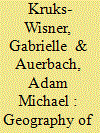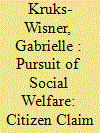| Srl | Item |
| 1 |
ID:
175835


|
|
|
|
|
| Summary/Abstract |
When and why do poor citizens expect the state to respond to their claims, and how do those expectations shape citizenship practice? Drawing on survey and qualitative research in northern India, our study reveals an expectations gap that complicates widely held views of the urban core versus the rural periphery. The urban poor residing in slums are dramatically less likely to believe that they will get a direct response from an official compared to similarly poor rural residents. Slum residents are also significantly more likely than villagers to report the presence of political brokers, who create mediated channels for claim-making. Reflecting on these patterns, we develop a place-based theory to explain sub-national variation in citizen-state engagement. We focus in the northern Indian context on three interrelated factors that shape the local terrain for citizenship practice: the greater visibility of social welfare provision in villages compared to slums; the greater depth of rural decentralization; and the greater strength of urban party organizations. Extending beyond northern India, we propose an analytical framework for the study of citizenship that examines how citizens’ local experiences of state institutions influence sub-national patterns of participation.
|
|
|
|
|
|
|
|
|
|
|
|
|
|
|
|
| 2 |
ID:
158576


|
|
|
|
|
| Summary/Abstract |
Who makes claims on the state for social welfare, and how and why do they do so? This article examines these dynamics in the rural Indian context, observing that citizens living in the same local communities differ dramatically in their approaches to the state. The author develops a theory to explain these varied patterns of action and inaction, arguing that citizen claim-making is best understood as a product of exposure to people and places beyond the immediate community and locality. This social and spatial exposure builds citizens’ encounters with, knowledge of, and linkages to the state. This in turn develops their aspirations toward the state and their capabilities for state-targeted action. The author tests the theory in rural Rajasthan, drawing on a combination of original survey data and qualitative interviews. She finds that those who traverse boundaries of caste, neighborhood, and village are more likely to make claims on the state, and that they do so through broader repertoires of action than those who are more constrained by the same boundaries. The article concludes by considering the extensions and limitations of the theory and the role of the state itself in establishing the terrain for citizen action.
|
|
|
|
|
|
|
|
|
|
|
|
|
|
|
|